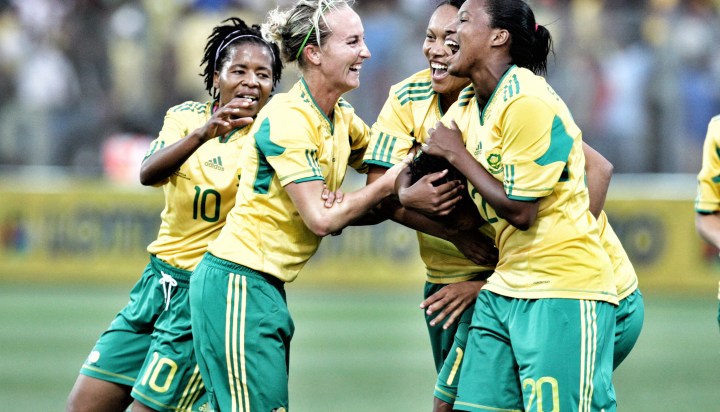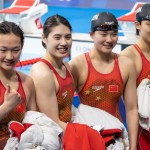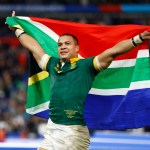2018 South Africa's Sports Team of the Year
Banyana Banyana – going from strength to strength

Banyana Banyana’s qualification for the 2019 World Cup in France was widely celebrated. While they would go on to lose the Africa Cup of Nations final, the achievement stands out among many great sporting moments of the year.
Ever since the 2016 Rio Olympics, Banyana Banyana have gone from strength to strength.
Viewed in isolation, their campaign was remarkable. Scratch the contextual surface, though, and the feat is even more impressive.
Coach Desiree Ellis has been very diplomatic about the South African Football Association (SAFA). For over a year, Ellis had to be content with “caretaker” prefix to her title. After Vera Pauw departed following the shambolic 2016 Rio Olympics, Ellis just got on with it.
There was criticism that she wasn’t suited to even the role of caretaker, but under her tutelage, the national team won the 2017 Cosafa Cup. That in itself was historic for Ellis, becoming the first South African to win it as both a player and a coach.
It would earn the team the CAF’s Women’s Team of the Year award in January 2018. But it would take SAFA more than a month to make Ellis’ job permanent.
Nine months later, and Ellis and Banyana successfully defended their title and added World Cup qualification to boot.
It’s a bit fashionable, and a bit lazy, to jest about how the women’s team has done something the men’s team hasn’t. But the context from which these jibes are borne which matters.
Most notable is the monetary differences. The financial struggles of the women’s team have been well documented. Following her retirement, legendary South African player Portia Modise famously said that she was “broke”, despite being one of the country’s most decorated players.
Not much has changed since then. Following their World Cup qualification, Safa awarded the squad with over R2.4-million in bonuses, to be shared between 21 players, of course.
For context and comparison, the men’s team regularly receive bonuses of R60,000 for a win and R30,000 for a draw. That’s just for playing, by the way, not any special qualification.
Notable, too, is the choice of players like Janine van Wyk who put country ahead of the club, despite having the skill to live out the twilight of her career earning a pretty penny in foreign currency.
Sponsor Sasol deserves credit for their financial backing, but the sport’s official governing body’s response is far less impressive.
Speaking to Soccer Laduma recently, SAFA’s Head of Communications, Dominic Chimhavi didn’t squirm when questioned on the discrepancies.
At pains to say how proud the organisation was of the women’s team, he is quick to justify why these issues remain apparent across the board.
“Do the Proteas or Springboks women teams get paid the same amount as their men’s counterpart? The answer is no.
“Or do female players from Real Madrid, Barcelona, Manchester United or Arsenal women’s team get paid the same amount as their male counterparts? No.
“The reality is corporates pay more towards men’s games as opposed to their female counterparts and until the day the corporates pour as much money into women’s games, the same way they do on men’s games, these differences will remain a harsh reality.”
But this is not about the institutional sexism that still dominates the sport, even if that context matters.
This is about a team that’s achieved more than anyone ever believed possible. A team that continues to thrive, despite all the odds constantly stacked against them. A team that covers high performance, despite constant disruptions. And it’s about a team who plays for the love of the beautiful game, a long-forgotten attribute in many sports.
Indeed, Ellis herself once said that women never played for money. Growing up in Salt River in the 1970s, when there was no women’s club, the coach would go on to be a trailblazer for the women’s game.
With a hat-trick on debut for the national side in 1993, the first-ever national women’s team, Ellis has championed women’s sport and it doesn’t look like there’s any stopping her or her charges.
Women’s sport continues to flourish in South Africa. And whatever happens with Banyana Banyana at the 2019 World Cup, surely by now they’ve proven themselves enough to secure the financial backing that can help elevate them to the next level.
Because if this is what can be achieved on a shoestring, imagine the wings they could stitch with a few extra tools. DM




















 Become an Insider
Become an Insider